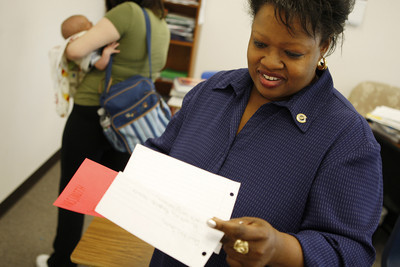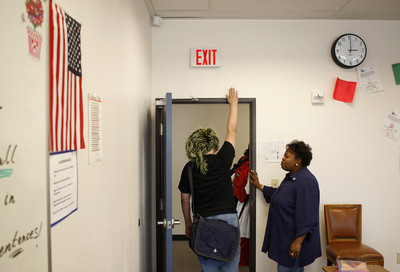School advocates distance learning
A charter school's founder is betting that instruction by Internet will be a good way to reach kids who have given up on formal education or whose lives are too complicated for an 8-to-3 school day.
Many of these students have self-esteem issues. A 16-year-old, for instance, might have seventh-grade math ability, but doesn't want to go to class with 12- and 13-year-olds.
Students with learning disabilities often lose a large part of their day in transportation to specialized schools far from their home. Their time might be better spent at home in front of a computer.
Wayne Tanaka, the executive director of the new Delta Academy, formerly known as Westcare Charter School, likes online education for the flexibility it offers in meeting the educational needs of students with varying abilities and personal crises such as drug abuse and troubles with the law.
But Tanaka realizes online education "is cutting edge."
"Distance learning is the new frontier of education," he said at the Thursday night meeting of the Clark County School Board.
In an interview, Tanaka acknowledged pitfalls such as the lack of accountability -- is the student the actual person logging onto a class?
Also, critics say online classes lack imagination and are too much like "rote learning," Tanaka said.
School Board members were reluctant to give their approval Thursday night, but it wasn't because they doubted Tanaka's abilities. They previously honored the retired public school principal by naming an elementary school after him.
School district trustees and administrators wondered about the effectiveness of his online approach. Even for the best students, "distance education is really hard," Trustee Ruth Johnson said.
Tanaka sought to amend his school's charter to change the school's name, and receive the board's blessing for distance education.
Although charter schools receive state funding and operate as independent public schools, they have more freedom in designing curriculum, and structuring class size.
Trustees pressed Ed Goldman, the district's associate superintendant for educational services, for a stronger recommendation beyond confirming that the charter school had met its educational requirements for the program.
"It's really your discretion," Goldman said.
After much discussion, the trustees decided to let Delta Academy try distance education for one year and report back to the School Board with its results.
Tanaka acknowledged challenges ahead. He is going to have to do a lot of fundraising.
One 16-year-old girl at the charter school said her family doesn't have a computer at home. She sometimes sells fresh-picked corn at public parks to supplement the family income. School officials asked her name not be used for privacy reasons.
The girl said she is overcoming a drug addiction and was expelled from public school for taking a knife to campus. She said the knife belonged to her boyfriend.
The charter school was known this year as Westcare. It was named after the residential juvenile rehabilitation facility of the same name that provided much of the funding for the school. The school serves many juvenile residents of Westcare, Tanaka said.
School officials decided to change its name to Delta Academy to reflect a broader mission in serving all kinds of students who don't fit into a traditional school, for whatever reasons.
Westcare served 65 students this year but enrollment is expected to double when it begins distance education next year. The number of teachers will double to 20. The school, near the corner of Rancho Drive and Craig Road, serves grades seven through 12. It's open to students in Southern Nevada.
Tanaka said studies have shown that distance education can work if the necessary steps are taken.
Students, for instance, will be required to come to school at least once a week for face time with their teacher. Distance education will be livened up with online discussion groups so students are not simply getting homework assignments.
Tanaka said the charter school will use special computer software to monitor whether students are actually doing their work rather than just logging on and wandering off.
He likes distance education because parents will have the opportunity to become more involved in their children's learning. It is also flexible for the students, who might be working jobs or taking time out each week for court-ordered drug tests.
Depending on their schedule, some students might only take one or two classes online but take the rest of their classes on campus.
Tanaka looks at distance education as a way to stretch the educational safety net.
"Many of these students only fit into the cracks," Tanaka said. "That's where they fall."
Contact reporter James Haug at jhaug@reviewjournal.com or 702-383-4686.


















